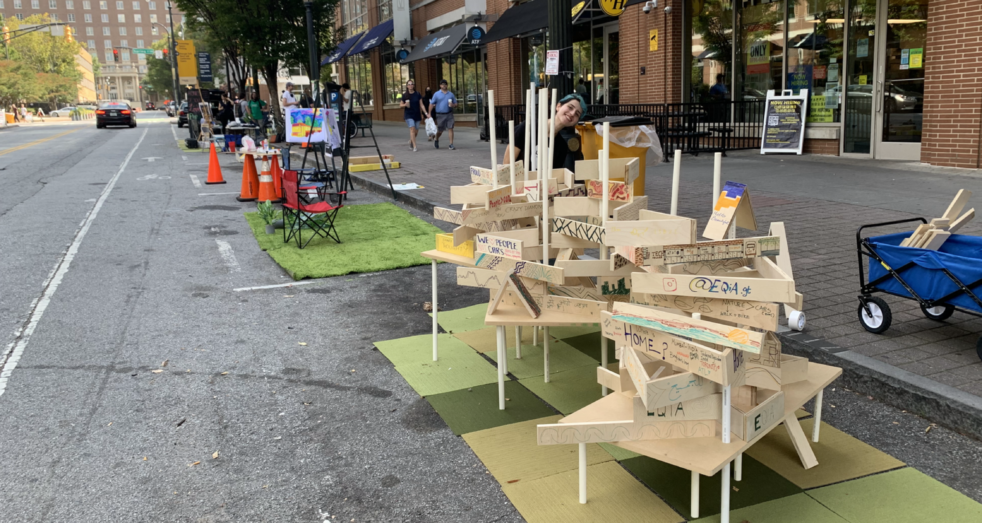On Friday, Oct. 3, Parking Day, a global public event that reclaims street parking spaces for public use for a day, was hosted by the Tech Student Planning Association (SPA) in Tech Square.
Promotional materials for the event said its purpose was to “spark a conversation with passersby to help educate them how public space is designed and allocated.”
“We are also hoping to inspire people to interact with these temporary public spaces in new and innovative ways,” the material continued.
For four hours, organizers occupied five parking spaces along 5th Street NW and granted participants creative control in how they wanted to repurpose the parking spaces. SPA provided attendees with art supplies to work on creative projects. Some spaces were lined with green carpet and lawn chairs to create makeshift parks. SPA also created activities for attendees to engage in such as trivia games and activities with prizes and snacks provided.
“Basically, the premise of Parking Day is to draw awareness to how much space we give cars, particularly in cities. As planners, we like to say we plan for people not cars,” said Bianca Mers,
CRP graduate student and president of SPA.
The event provided attendees with an opportunity to have fun with friends and enjoy the beautiful weather. But Parking Day went beyond a fun day of activities to educate the public about the cost of parking financially, environmentally and socially with accessible alternatives to parking.
Parking in Atlanta can be costly, but organizers say parking that requires pay is important. Free parking is not free. If the consumer does not pay for it, the cost of the space and its use is subsidized by businesses, employees and cities. The burden of this cost can result in higher taxes, rent and other living expenses such as food and shopping.
Alternative forms of travel such as walking and public transportation are more environmentally friendly. Additionally, parking spaces can be expensive and inaccessible. Parking Day wants to encourage everyone to reimagine what their cities would look like if these spaces were allocated to better benefit the community, such as with a park.
“If we’re giving a lot of land to cars, and we’re giving more of that land to cars than we do to people, then that’s really telling of where our priorities are,” Mers said.
Mers said it is important to start these conversations about land use with members of the public.
When discussing social issues such as a lack of green space or affordable housing and where to put such spaces, she wants community members to remember the parking spaces.
Many people underestimate how much city planning influences their lifestyles and everyday choices, especially where they live, how they travel and where they spend their time and money. In Atlanta, Mers said that the city is not very walkable or bikeable and the public transportation system is in need of improvement. But the public did not make these decisions. Instead, these choices were made on their behalf by city planners.
According to Mers, Parking Day wants to let community members know that their opinions and ideas on parking matter. The best way to make their voice heard is through voting. Many of the land use decision makers are found in down ballot races, which are local or state races that fall below the presidential or nation-wide elections on the ballot.
“Further reason why we, as city planners, take pretty strong political opinions sometimes is because a lot of the people you vote into office allocate where your resources go,” Mers said.
Down ballot races and local elections often contribute the most to citizens’ everyday lives but are the hardest races to get the community engaged in. Parking Day, in part, works to ensure community members are informed on land use issues and how to make changes in their communities.
Mers wants to encourage everyone to use their voice and their votes to help create a city that allocates its land in the best interests of its people.
“Especially now, as we look to the future of planning and what it means to be a livable city and how we can make cities more equitable and more just — a huge part of that is how we use our land,” Mers said.
To learn more about Georgia Tech’s Parking Day and getting involved with SPA, visit @spa_georgiatech on Instagram.
